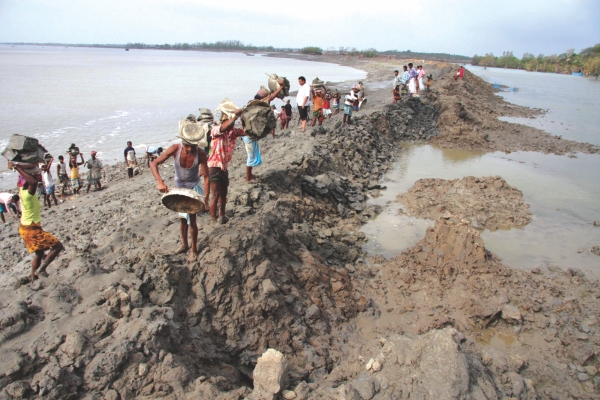
Inside
|
Incorporating Religious Institutions in Climate Change Adaptation: an Islamic perspective
Islamic values of nature management may be applied to counter the threat of climate change, suggests MOHAMMED ABDUL BATEN.
 |
Photo: STAR |
Over the last few decades, climate change discussions have been under way though they gained momentum after Hansen's testimony on global warming presented in US congress about 20 years ago. Despite dispute over future consequences of climate change, now the science is set to the point that climate change is happening. Recent Stern review (2006) shows how devastating will be the impacts of climate change both on economy and society. The pervasive effects of climate change regardless of territorial boundaries and races have forced international communities to include representatives from all sectors of the community in climate talks. The epistemic communities are analysing climate change from different points of view, ranging from pure scientific to socio-political aspects. Recently, ethical and religious dimensions of climate change have gotten attention.
Religion is the oldest and most accepted institution in the world that holds supreme potential to reach and influence people in terms of numbers apart from profession, age, social strata and political differences. In terms of numbers, 4.7 billion of the world's population (6.38 billion) identify with one of the world's 12 classical organised religions, ranging from about 2 million to 2 billion adherents each (mid-2004 estimates, Encyclopaedia of Britannica, 2004). Therefore, taking into account the vast majority of religious believers, an appeal for individual environmental responsibility could be used as a part of its argument, at least, an appeal to the individual's religious beliefs (Posas, 2007).
In climate conference, religion got a position at the third session of the Conference of the Parties (COP3) in Kyoto Japan in 1997 when inter-religious activities were held with Buddhists, Shintos, New Religions and Christians. Later, At COP7 in Marrakech Morocco in 2001, Muslim and Christian participants shared common concerns about the spiritual and ethical dimensions of climate change from their respective sacred texts and traditions in a workshop.
Religious engagement in climate talks is demonstrating that climate change is more than a scientific, ecological, economic and political concern but has important spiritual and ethical dimensions as well (Hallman, 2003).
A function provided uniquely by religion is an appeal to the heart, human empathy, and higher values that inspire individuals and societies to transcend narrow self interest (Posas, 2007). Such appeals help in establishing moderation, restraint, and willingness to sacrifice for the common good such as changing our unsustainable luxurious consumption behaviour, responsible for emitting more CO2 (prime agent of global warming), also resonates in this year's (2008) World Environment Day slogan "Kick the Habit: Towards a Low Carbon Economy".
Another function which may in fact be a major key for sustained progress on mitigating climate change as argued by Buell (2001) is that the success of environmentalist initiatives hinges not only on new developments in science and technology, but on a state of mind that is bound to be influenced as much (or more) by the power of images, narratives, metaphors and by appeals to feeling as by appeals to data, statistics, expertise and formal reasoning; and religion has the power to reconstruct peoples' mental map.
 Photo: ANISUR RAHMAN
Photo: ANISUR RAHMAN
If we analyse existing formal and informal institutions prevailing all over the world that shape human behaviour and lifestyle, we would see that most of them are influenced by some religious beliefs (There is 'high agreement' in the IPCC that changes in lifestyle and behaviour patterns can contribute to climate change mitigation across all sectors, and ones that 'emphasize resource conservation can contribute to developing a low-carbon economy that is both equitable and sustainable'--IPCC 2007c, p. 12). Such insidious influence of religion over humanity creates an opportunity to use its enormous force in developing effective strategies against climate change. In this article, I only illuminate Islamic perspectives of climate change.
Though impacts of climate change are unbiased yet, Muslim countries, commonly identified as the world's poor block, are mostly affected due to their less resistance power and geographic location. Sidr in Bangladesh is one of the recent examples of climate change effect on Muslim countries. The environment of Muslim countries is severely degraded. Islam has clear guidelines about environmental management but ignorance about Islamic knowledge, insufficient environmental research, and above all unregulated and religiously unsupportive lifestyle of Muslims are responsible for the current sullied condition.
What would be the relationship between man and nature is clearly portrayed in Islam. The Muslims believe that everything on earth is solely created by Allah (In this article Allah, the Almighty, and the Creator all are used synonymous to God) and everyone will be asked and accused for what they have done on doomsday. In this respect the almighty announces in the Holy Qur'an, "Glory to Allah, Who created in pairs all things that the earth produces, as well as their own (human)kind and (other) things of which they have no knowledge" (Surah Ya-Sin, Ayat 36).
The Almighty has created all things on earth for the well being of humans and in a balanced condition. Allah announces in the holy Qur'an, "And the earth we have spread out (like a carpet); set thereon mountains firm and immovable; and produced therein all kinds of things in due balance" (Surah Al-Hijar, Ayat 19). Unfortunately, forgetting the real teaching of Islam, human beings have used natural resources in such an unfettered way that it has caused the extinction of many plants and animals
(biodiversity) and some are under threat of extinction. The loss of valuable biodiversity is responsible for unsteadiness of natural environment and resultant frequent natural hazards, which is also evident from several scientific researches.
Islamic lifestyle is based on the Qur'an and the Sunnah. Islamic teaching offers an opportunity to understand the natural order and to define human responsibility. Clearly, Islam imposes four responsibilities to human beings. These are responsibilities to the Creator (Allah), responsibilities to oneself, responsibilities to humanity, and responsibilities to all creatures. How these responsibilities will be well executed, guidelines are given in the Qur'an and the Sunnah.
The teaching of Islam about environment stands on three principles -- Tawheed, Mizan and Khalifa.
Tawheed is the main pillar of Islamic belief which states the oneness of the Creator (Allah) and his supremacy over everything on earth and it is to be believed that he is the creator of everything on earth.
Allah says, "But to Allah belong all things in the heavens and on earth; and he it is that encompasseth all things" (Surah An-Nisaa, Ayat 126).Therefore, any abuse of creature is considered as sin in Islam.
 Photo: ANISUR RAHMAN
Photo: ANISUR RAHMAN
Mizan is the principle of balance. Everything on the earth, the sun, the moon, the stars and all the creations always follow a natural order, set by the Almighty. If they do not conform to the natural laws, it would be impossible for life to function on earth. Therefore, we have responsibility to abide by the natural order and take care of everything instead of violating their normal structure. In the Qur'an Allah says, "(Allah) Most Gracious! It is He Who has taught the Qur'an. He has created man: He has taught him speech (and Intelligence). The sun and the moon follow courses (exactly) computed; And the herbs and the trees both (alike) bow in adoration. And the Firmament has He raised high, and He has set up the Balance, in order that ye may not transgress (due) Balance" (Surah Ar-Rahman, Ayat 1-8).
Khalifa or the role of stewardship is the duty that the Almighty ascribed to human beings. Allah created humans as the best creature and it is their responsibility to take care of other creatures. In this regard, in the Qur'an Allah says, "It is He Who hath made you (his) agents, inheritors of the earth: He Hath raised you in ranks, some above others: that He may try you in the gifts He Hath given you: for Thy Lord is quick in punishment: yet He is indeed Oft-Forgiving, Most Merciful" ( Surah Al-An'Am, Ayat 165). He also declares, "There is not an animal (that lives) on earth, nor a being that flies on its wings, but (forms part of) communities like you. Nothing have we omitted from the book, and they (all) shall be gathered to their lord in the end " (Surah Al-An'Am, Ayat 38). The greatest Prophet Mohammed (Pubh) also believed that humans are the caretakers of all creatures, not owners.
In Islam, any kind of pollution is seen as illegal activity and the Almighty warned humankind not to do that. He announces, "Mischief has appeared on land and sea because of (the meed) that the hands of man have earned, that (Allah) may give them a taste of their Deeds: In order that they may turn back (from the Evil)" (Surah Ar-Rum, Ayat 41).
Therefore, worldwide increased intensity of natural hazards is not wonder; it is the consequence of our irrational actions.
Now humanity is under threat of great devastation. Undoubtedly, we are responsible for the current situation as testified by Islam and science as well. To counter the impacts of climate change, everybody, from scientists to policy makers, is emphasising on increasing adaptive capacity of humans. It is argued that increasing tree coverage, conservation of biodiversity, appropriate land management, rational use of water resources and changing our consumption behaviour overall could contribute positively to the current endeavours against climate change. In fact, Islam gives us clear guidelines about natural resources management to face the challenges of climate change.
The Prophet emphasises on sustainable management of fertile land and tree plantation. He announces, "If a Muslim plants a tree, that parts of its produces consumed by men will be as almsgiving for him. Any fruit stolen from the tress will be as almsgiving for him. That which the birds eat will also be almsgiving for him. Any of its produce which people may eat thus diminishing it, will be as almsgiving for the Muslim who planted it". In another Hadith [The saying of the Prophet (Pubh)] He declares, "If Muslim plants a tree, then whatever is eaten from it by birds is a charity, and whatever is stolen is also a charity."
Water is considered as a gift from Allah by the Muslims. In the holy Qur'an, water is described as basis of life on earth, "Do not the Unbelievers see that the heavens and the earth Were joined together (as one Unit of Creation), before we clove them asunder? We made from water every living thing. Will they not then believe? " (Surah Anbiya, Ayat 30). Science has also come to the consensus that water is the primary source of life on earth. Water has given great importance in Islam, and in the Qur'an the word 'Water' (Arabic-Ma) is used 63 times.
Mohammed (Pubh) was concerned about sustainable management of water resources. He declared the vicinity of water sources as protected area (Arabic-Haram zone) for safeguarding its purity and ensuring continuous supply. Influenced by this principle, many countries have declared the natural water sources as 'protected areas' like the starting point of rivers. Namaj is one of the pillars of Islam, and for it one has to be clean and sanctified through Wudu for which is required pure and clean water. The prophet was very conscious about water pollution and its controlled use. Even though water is abundant, He advocated for thriftiness. In the Hadith, it is given that Mohammed (Pubh) used only 0.65 litre of water after urinating and 2-3.5 litres of water for bathing. He was very strict about water pollution and forbade his followers from urination in stagnant water.
Inevitably, we have no alternative but the sustainable use of natural resources to protect ourselves from harsh natural calamities aggravated by climate change. We have to change our reckless resource use pattern.
In this respect the holy Qur'an declares, "It is He Who produceth gardens, with trellises and without, and dated, and tilth with produce of all kinds, and olives and pomegranates, similar (in kind) and different (in variety): eat their fruit in their season, but render the dues that are proper on the day that the harvest is gathered. But waste not by excess: For Allah loveth not the wasters" (Surah Al An'Am, Ayahat 141).
Bangladesh is one of the most affected countries from the impacts of climate change. Accordingly, we should have appropriate strategies about climate change. Islamic knowledge about environment would be an influential tool in this regard that shape peoples' mind and behaviour about nature management as the majority population of Bangladesh is Muslim. Unfortunately, now-a-days we see terrorism elsewhere in the name of Islam, though Islam never supports it. We also observe using peoples' religious empathy in dirty politics. Some political parties use it as a ladder to win in elections. They often deliver wrong information about Islam for the sake of their own interest.
Being one of the largest Muslim countries in the world, Bangladesh can apply religious ideals to the problem of climate change. The government can include the Imams and religious leaders in climate talks to motivate people as they have great influence on people. The ministry of religious affairs, the Islamic foundation, and Islamic studies departments of different universities can conduct research on various aspects of climate change from Islamic perspective and disseminate the knowledge to the mass people which could contribute positively in our current endeavours against climate change. These kinds of actions will also contribute against wrong understanding of religious knowledge and raise voice against all kinds of terrorism in the name of Islam.
Islam is a religion of peace and humanity, and climate change is the greatest threat to humanity in the contemporary world. Hence, we cannot but follow the guidelines provided by Islam as well as science to safeguard ourselves from upcoming climate hazards. In this respect, Dutch anthropologist Francesca De Chattel argues, "As we face the effects of pollution and overexploitation, desertification and water scarcity in some parts of the world and floods and violent storms elsewhere, it is perhaps time for the world community as a whole, Muslims, Christians and Jews, Hindus and Buddhists, atheists and agnostics, to take a leaf out of the Prophet's book (Islamic knowledge) and address the current environmental crisis seriously and wisely."
Translation of the Qur'an by Yusuf Ali has been used in this article.
Mohammed Abdul Baten is a researcher at Unnayan Onneshan (a progressive research organisation). He can be reached at a.baten@unnayan.org